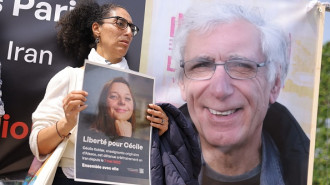Over 1000 'disappearences' blamed on militias in Salahuddin, Iraq
Over 1000 'disappearences' blamed on militias in Salahuddin, Iraq
Iraq's Popular Mobilisation militias have been accused of forcibly disappearing over a thousand people in Salahuddin province in Iraq.
2 min read
Militias have been accused of numerous human rights abuses [Getty]
Armed militias continue to commit abuses in areas of Salahuddin province, according to official reports which allege forced disappearences carried out by the groups.
Officials say that around 1000 people have been arrested by militias after the areas were liberated, and their whereabouts remain unknown.
"A number of armed factions are arresting citizens without any prior knowledge or coordination with security agencies in the province," said MP Abdul Kahar Samurani, who urged the commander in chief of the Armed Forces to "guide security forces" in the area.
Abdul Kahar emphasised the importance of intelligence gathering in order to find the perpetrators.
"The abduction of citizens from their homes by people appearing to belong to armed factions has escalated continuously," he said.
"Continued silence concerning these human rights abuses is unacceptable."
Hamid al-Jabouri, a member of the local council in the town of Beiji, however, was more direct in his accusations.
"Those who carried out arrests and kidnappings in the liberated areas in the province are known to all - that is some factions of the Popular Mobilisation militia [Al-Hashd al-Shaabi]", Jubouri said, noting that no other armed factions had any significant influence or control in the area.
"The arrests and kidnappings were carried out by factions of al-Hashd in full view of the security services who are not able to oppose such operations," he said, adding that the government is unable to take any action that "limits the influence of the militias".
The Popular Mobilisation is an Iraqi government-backed umbrella organisation made up of several Shia militias who were united under the auspices of the Iraqi Ministry of Interior in June 2014.
Ayatollah Mahmoud al-Hasani al-Sarkhi, who opposes Iranian influence in Iraq, recently told The New Arab: "You can't separate Al-Hashd and the government, as it has become a part of the military institution and under [the command of] the commander in chief of the armed forces."
A recent Human Rights Watch report accused Iraqi security forces and pro-government militias of committing possible war crimes during 2015 in their fight against IS, by unlawfully demolishing buildings in recaptured areas and forcibly disappearing residents.
Officials say that around 1000 people have been arrested by militias after the areas were liberated, and their whereabouts remain unknown.
"A number of armed factions are arresting citizens without any prior knowledge or coordination with security agencies in the province," said MP Abdul Kahar Samurani, who urged the commander in chief of the Armed Forces to "guide security forces" in the area.
Abdul Kahar emphasised the importance of intelligence gathering in order to find the perpetrators.
"The abduction of citizens from their homes by people appearing to belong to armed factions has escalated continuously," he said.
"Continued silence concerning these human rights abuses is unacceptable."
 |
The arrests and kidnappings were carried out by factions of al-Hashd [Popular Mobilisation] in full view of the security services. —Hamid al-Jabouri, local council member |
 |
Hamid al-Jabouri, a member of the local council in the town of Beiji, however, was more direct in his accusations.
"Those who carried out arrests and kidnappings in the liberated areas in the province are known to all - that is some factions of the Popular Mobilisation militia [Al-Hashd al-Shaabi]", Jubouri said, noting that no other armed factions had any significant influence or control in the area.
"The arrests and kidnappings were carried out by factions of al-Hashd in full view of the security services who are not able to oppose such operations," he said, adding that the government is unable to take any action that "limits the influence of the militias".
The Popular Mobilisation is an Iraqi government-backed umbrella organisation made up of several Shia militias who were united under the auspices of the Iraqi Ministry of Interior in June 2014.
Ayatollah Mahmoud al-Hasani al-Sarkhi, who opposes Iranian influence in Iraq, recently told The New Arab: "You can't separate Al-Hashd and the government, as it has become a part of the military institution and under [the command of] the commander in chief of the armed forces."
A recent Human Rights Watch report accused Iraqi security forces and pro-government militias of committing possible war crimes during 2015 in their fight against IS, by unlawfully demolishing buildings in recaptured areas and forcibly disappearing residents.





 Follow the Middle East's top stories in English at The New Arab on Google News
Follow the Middle East's top stories in English at The New Arab on Google News

![The law could be enforced against teachers without prior notice [Getty]](/sites/default/files/styles/image_330x185/public/2178740715.jpeg?h=a5f2f23a&itok=xMdFOAIF)
